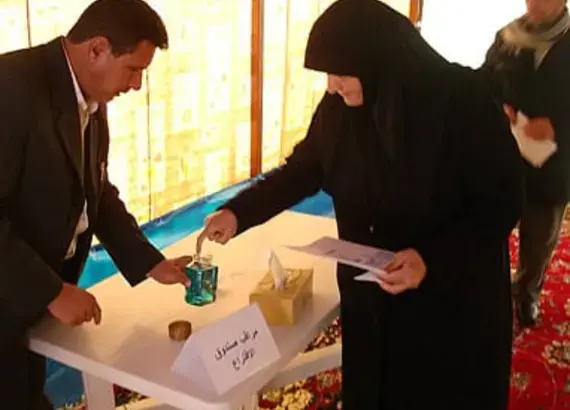
Success Story
In Iraq, Pre-election Survey Shows Growing Optimism and Support for Elections
Iraqis appear to be more positive about where their country is heading than they were last fall, according to the findings of a new NDI pre-election survey conducted from January to early March. Of those surveyed, 41 percent believe the country is headed in the right direction, a 10 point increase from NDI’s last public opinion poll in September.
The nationwide poll comes just weeks before national elections—the first to be held since the U.S. troop withdrawal. On April 30, Iraqis are scheduled to elect a new 328-member Council of Representatives (CoR), which will ultimately elect a new prime minister, president and cabinet. In addition, the poll provides critical insight ahead of provincial council elections in the Kurdistan Regional Government (KRG), also scheduled for April 30.
Developed by Greenberg Quinlan Rosner (GQR) and NDI, the poll gauged public sentiment on a range of issues. In total, 2,000 face-to-face interviews were conducted, representing a broad cross-section of Iraqis from geographically and ethnically disparate provinces. NDI previously commissioned GQR to conduct nationwide opinion polls in February and September 2013.
The poll revealed that a majority of Iraqis (65 percent) rated democracy as “the best form of government” and a greater share (72 percent) regarded elections as a “good thing” for Iraq. In addition, the results showed 75 percent of Iraqis were more “enthusiastic about voting in this April’s parliamentary elections compared to previous elections.” Despite that growing enthusiasm, sentiments in the Sunni-dominated West remain tempered, with 58 percent questioning the legitimacy of the upcoming election.
While entrenched sectarian divisions continue to color Iraq’s political climate, the country’s improved mood has been largely driven by perceived improvements in basic services. A majority of Iraqis said electricity (66 percent), education (56 percent), and cost of living (55 percent) were steadily improving.
Across Iraq, voters are likely to be swayed by political parties and candidates who focus on issue-based platforms that produce tangible results for average Iraqis. A plurality of voters voiced support for policies that provide access to loans for small businesses (42 percent), improve the quality of teachers (46 percent), and decrease the cost of medicine (37 percent). However, the public was equally divided over whether policies should, overall, focus on long-term issues, such as infrastructure, or immediate concerns, such as job creation.
Additional findings include:
- Security, unemployment and corruption continue to dominate the concerns of Iraqis. More than half the participants (52 percent) named security as one of the two most important issues; jobs and unemployment placed second at 45 percent. While results indicated an overall positive shift in the country’s mood, a majority still view corruption (71 percent) and the government’s responsiveness to the people’s needs (56 percent) as getting worse.
- While attitudes toward the direction of the country improved in all regions, the Sunni-dominated West (Anbar, Ninewa, Salahaddin, and Kirkuk) and the Kurdish North continued to have an overall pessimistic outlook. The survey found 70 percent in the West and 59 percent in the North thought Iraq was heading in the wrong direction; both regions had a majority (54 and 56 percent respectively) that viewed Iraq as a divided country. Reflecting overall doubts regarding the credibility of the upcoming electoral process, the West was also the least enthusiastic region about the upcoming elections, with just 49 percent expressing more enthusiasm for “April’s parliamentary election compared to previous elections.”
- Although voter turnout in April is expected to be similar to previous elections at 63 percent, fears about personal security and a lack of trust in the integrity of the elections are expected to keep voters from going to the polls. Of the 37 percent of Iraqis who are unlikely to vote, 37 percent did not believe they would feel safe when voting whereas 31 percent felt the elections would not be free and fair. Some 58 percent of Iraqis in the West shared the sentiment that elections would not be free and fair.
Read findings from previous public opinion surveys in Iraq:
-->
Watch the event on prospects for Iraq's April 30 elections, featuring Elvis Zutic, NDI Iraq resident director:
Published April 18, 2014



